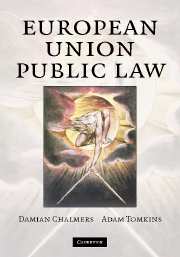Book contents
- Frontmatter
- Map of the European Union
- Preface
- Contents
- Abbreviations
- Acknowledgments
- Table of Cases
- Table of Treaties, Instruments and Legislation
- Table of Equivalents
- Electronic Working Paper Series
- PART I Constitutional and Institutional Law
- 1 European integration and the treaty on European Union
- 2 Constitutionalism and the ‘failure’ of the Constitutional Treaty
- 3 The EU Institutions
- 4 Community law-making
- 5 Sovereignty and federalism: the authority of EU law and its limits
- 6 Fundamental rights
- 7 Judicial relations in the European Union
- PART II Administrative law
- Index
- References
6 - Fundamental rights
Published online by Cambridge University Press: 05 June 2012
- Frontmatter
- Map of the European Union
- Preface
- Contents
- Abbreviations
- Acknowledgments
- Table of Cases
- Table of Treaties, Instruments and Legislation
- Table of Equivalents
- Electronic Working Paper Series
- PART I Constitutional and Institutional Law
- 1 European integration and the treaty on European Union
- 2 Constitutionalism and the ‘failure’ of the Constitutional Treaty
- 3 The EU Institutions
- 4 Community law-making
- 5 Sovereignty and federalism: the authority of EU law and its limits
- 6 Fundamental rights
- 7 Judicial relations in the European Union
- PART II Administrative law
- Index
- References
Summary
Introduction
The original EEC Treaty contained no system of fundamental rights protection. A bill of fundamental rights would have given the EC state-like characteristics which, at the time, were not anticipated for it. Furthermore, the relatively limited scope of the EEC Treaty, with its focus on instituting a common market, provided limited opportunities for possible conflicts between EC acts and fundamental rights. If conflicts did arise, states expected their national constitutions to be the best guarantee of protection of fundamental rights. The early case law of the European Court of Justice reflected this line of thinking. In a series of judgments through to the mid-1960s, it refused to countenance arguments that the EC institutions had violated some right protected in national constitutions. The Treaties contained no reference to these fundamental rights, and, in the light of this, the Court resisted implying that it and other EC institutions were responsible for the protection of these fundamental rights. These assumptions were changed by Van Gend en Loos and Costa v ENEL. The supremacy of EC law meant that national constitutional provisions could no longer be used to safeguard fundamental rights in all circumstances, as any EC legal provision took precedence over them. These judgments not only created this lacuna in protection, but also begged the question as to why this should be so.
- Type
- Chapter
- Information
- European Union Public LawText and Materials, pp. 232 - 271Publisher: Cambridge University PressPrint publication year: 2007



